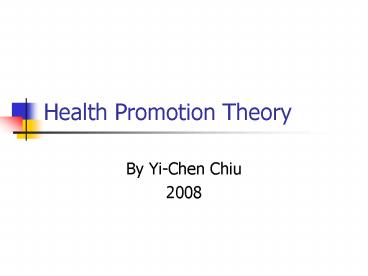Health Promotion Theory - PowerPoint PPT Presentation
1 / 29
Title:
Health Promotion Theory
Description:
The average life expectancy has increased, the number of years of ... Symbolization: *Forethought: *Vicarious learning. The theoretical basis for the HPM 7 ... – PowerPoint PPT presentation
Number of Views:840
Avg rating:3.0/5.0
Title: Health Promotion Theory
1
Health Promotion Theory
- By Yi-Chen Chiu
- 2008
2
Definitions of health
- See handout
- Your definition of health
3
Definitions of health promotion
- See handout
- Your definition of health promotion
4
The challenges of health
- The average life expectancy has increased, the
number of years of healthy living has declined. - Considering quality of life
- How to implement health behavior change
strategies, disease prevention, and health
promotion interventions.
5
Nursing roles in health promotion
- Nurses as health care coordinators
- Nurse as public health educators
- Therefore, health promotion is defined as the
combination of educational and ecological
supports for actions and conditions of living
conductive to health.
6
Health behavior change
- The process of health education directs people
toward voluntary changes of their health
behaviors. - The social learning theory (SLT)
7
Definition of health behavior
- Health behavior are any activities that an
individual undertakes to enhance health, prevent
disease, and detect and control the symptomatic
stage of a disease.
8
The social learning theory (1)
- The social learning theory is renamed as the
social cognitive theory. - Bandura (1997) emphasizes the influence of
efficacy beliefs and outcome expectations on
health behavior.
9
Self-efficacy
- Self-efficacy refer to an individuals perception
of self-competence to perform the behavior
required to influence outcomes it is a judgment
of ones ability to carry out a particular course
of action. it is a judgment of ones ability to
carry out a particular course of action. - Self-efficacy is different from outcome
expectation
10
Outcome expectation
- Outcome expectation Outcome expectation is the
assumed consequences of action taken. Outcome
expectations refer to a persons estimate that a
given behavior will lead to a particular outcome.
11
The relationship between self efficacy and
outcome expectation
- Diagram of self-efficacy concept
Person
Behavior
Outcomes
Efficacy belief Level, strength, generality
Outcome expectations Physical, social,
self-evaluation
12
The social learning theory (2)
- Behavior is regulated by its consequences
(reinforcements) - Considering the incentive
- Considering the environmental cue
13
Comments on the Social Learning Theory
- Positive and negative reinforcements vs.
punishment - Modeling
14
Comments on self-efficacy
- Self-efficacy is a focal determinant
- Self-efficacy shapes the outcomes people expect
their efforts to produces.
15
Health promotion model (HPM) 1
- See handout for the old vs. revised models
- The HPM is a competence- or approach-oriented
model.
16
The theoretical basis for the HPM 2
- Expectancy-value theory
- the outcome is of positive personal value
- based on available information, taking this
course of action is likely to bring about the
desired outcome.
17
The theoretical basis for the HPM 3
- Expectancy-value theory
- Subjective value of change
- Subjective expectancy of successfully
obtaining the change or outcome
18
The theoretical basis for the HPM 4
- Social cognitive theory
- an inter-actional model of causation between
environmental events, personal factors, and
behavior - self-observation self-reflection
self-belief - Self-belief influences individual behaviors
19
The theoretical basis for the HPM 5
- Self-belief includes self-attribution, self
evaluation, and self-efficacy. - Self-efficacy are particularly important.
- Perceived self-efficacy
20
The theoretical basis for the HPM 6
- Social cognitive theory believes that human
processes the following basic capabilities - Symbolization
- Forethought
- Vicarious learning
21
The theoretical basis for the HPM 7
- Self-regulation
- Self-reflection
22
Assumptions of the HPM 1
- Persons seek to create conditions of living
through which they can express their unique human
health potential. - Persons have the capacity for reflective
self-awareness, including assessment of their own
competencies. - Persons value growth in direction viewed as
positive and attempt to achieve a personally
acceptable balance between change and stability. - Individuals seek to actively regulate their own
behavior.
23
Assumptions of the HPM 2
- Individuals in all their biopsychological
complexity interact with the environment,
progressively transforming the environment and
being transformed over time. - Health professionals constitute a part of the
interpersonal environment, which exerts influence
on persons throughout their life span. - Self-initiated reconfiguration of
person-environment interactive patterns is
essential to behavior change.
24
Studies using the HPM
- Health-promoting lifestyles of blue-collar
workers a multicultural population of 179 cases - Variables tested importance of health, perceived
control of health, perceived self-efficacy and
perceived health status
25
Limitations of HPM
- It is a complex model
- Has not been tested for the whole model (5 to 12
variables have been studied)
26
Comments on HPM 1
- The behavior-specific variables of perceived
self-efficacy, benefits and barriers were
supported as predictors of health behaviors in
the majority of studies.
27
Comments on HPM 2
- Clarity
- Simplicity
- Generality
- Empirical precision
- Derivable consequences
28
Why to use health-promotion theories?
- They are relatively easy to understand.
- They provide an explanation as to why
interventions dont always work. - They provide more readily achievable goals not
just all or nothing. - They are applicable to a wide range of behaviors.
- They locate a practitioners input into the
context of the clients experience.
29
References
- Lucas, K. Lloyd, B. (2005). Health promotion
evidence and experience. CA Thousand Oaks.







![[PDF] Health Promotion Throughout the Life Span 9th Edition Full PowerPoint PPT Presentation](https://s3.amazonaws.com/images.powershow.com/10079280.th0.jpg?_=202407160512)























